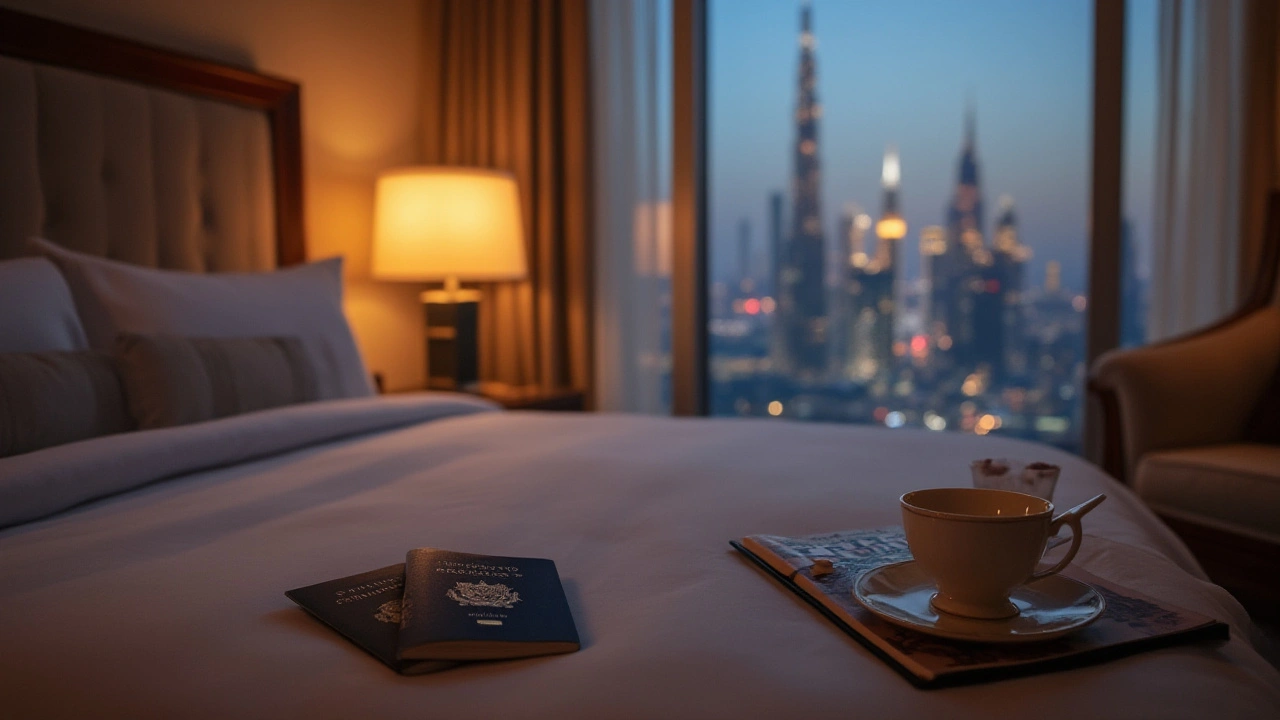Beds shared, secrets whispered, passports stamped—and then a question nobody wants to say out loud: Can you actually sleep together in Dubai? The city glitters. The hotels are plush. The beaches are stunning. Still, no matter how Instagram-perfect it all seems, the local laws can leave travelers and expats more nervous than they expected. In a place where law and culture still mix like oil and water for outsiders, what actually happens if you—and your partner—want to share a bed?
Understanding the Law: What Dubai Actually Says About Unmarried Couples
If you’re heading to Dubai with your significant other, odds are you’ve already heard stories. "You can’t even check into a hotel with your boyfriend!" "They’ll arrest you for holding hands!" The reality, like most things, is a little more complicated, and a whole lot less dramatic than old guidebooks make it sound.
The main law that left so many travelers confused is Article 356 of the UAE Penal Code, which historically criminalized extramarital sex and cohabitation. For years, this law meant, on paper, that unmarried couples—straight or gay—risked fines or, very rarely, jail for sharing a bed. But the key word here is “rarely.” Since November 2020, the UAE government made major updates to their personal laws, including officially decriminalizing cohabitation for unmarried couples. Sleeping together if you aren’t married is no longer a criminal offense.
This doesn’t mean the old attitudes have vanished overnight. Locals still value privacy and conservatism. You won’t find Emiratis making out on Jumeirah Beach or talking about Tinder dates in cafés. But the government recognizes Dubai’s role as a global city where millions of tourists and expats visit every year, so there’s a deliberate shift toward privacy in hotel rooms and homes, so long as you don’t cause a public problem.
For example, according to a statement from the UAE government last year, “Private life is respected in accordance to the law unless a complaint is filed.” So, if you share a bed with your partner in a hotel or an apartment, you’re unlikely to see any trouble—unless you pick a fight, disrupt neighbors, or turn your stay into a tabloid-worthy scandal.
What about the big question: Is it safe? Local police rarely get involved in consensual adult relationships inside hotel rooms. There are no recorded incidents of tourists being arrested simply for checking in as an unmarried couple. If anything, Dubai’s hospitality industry has mastered the art of quiet discretion. They care way more about your credit card than your relationship status. Even so, if you wind up the subject of a police complaint—say, there’s excessive noise, public displays of affection, or an angry ex gets involved—the law could suddenly come into play.
Take a look at the changing trend in reported cases related to cohabitation:
| Year | Reported Cases of Cohabitation (Dubai Only) |
|---|---|
| 2016 | 37 |
| 2018 | 12 |
| 2021 | 0* |
*No public data reported, as most cases are now dismissed due to changed laws.
So yes—you can legally sleep together in Dubai as an unmarried couple, but your experience will depend on your behavior, privacy, and whether you make a scene. It’s still smart to keep it all low-key. If things go wrong, being foreign isn’t always a get-out-of-jail-free card, though it usually means the issue goes away after a warning (and possibly a polite lecture).

Hotels, Apartments, and Short-Term Rentals: What to Expect When Booking Together
In the world of five-star hotels, marble bathtubs, and tiny Airbnbs, you’d think someone would care about your relationship status—but mostly, they don’t. Hotels change with the times, too. Today in Dubai, nearly every hotel welcomes couples—married or not—without raising an eyebrow. Gone are the days when they’d demand a wedding certificate at check-in. Try to remember the last time a hotel outside the Gulf cared about paperwork: that’s the current mood in Dubai.
There are stories from the early 2000s of front desk clerks raising questions, and even as late as 2015, some mid-range hotels quietly turned away unmarried Arab couples, usually those from other GCC countries. Fast forward to now: thanks to international business, tourism, and new laws, these rules have relaxed. Most hotels don’t ask for anything except ID and a credit card. If you book a double room, nobody at the desk cares if you’re married, friends, or even related.
Let’s talk paperwork. Practically speaking, you only need your passport (or Emirates ID if you’re a resident) at check-in. Some luxury hotels, trying to attract more couples, even offer honeymoon “for two” packages to anyone booking. Hotel websites stopped using phrases like “for married couples only”—unless you’re talking about small, family-run guesthouses in strictly local neighborhoods (and even those are getting rare). Still, if you want to avoid even a hint of discomfort, international hotel chains are your safest bet; they get the most training and are keen to avoid bad reviews over awkward questions about marriage certificates.
Serviced apartments, Airbnbs, and short-term rentals play it even cooler. These places rarely have staff snooping around your private life. If you rent a place, nobody’s coming by to check if you have matching rings. The only time things get sticky is when guests throw loud parties, smoke on balconies, or break obvious rental rules. That kind of behavior will get you a warning faster than anything about sleeping arrangements.
Just a couple things to remember:
- Sleep together Dubai—Hotels are focused on professionalism and privacy, not your relationship status.
- If you’re part of the LGBTQ+ community, same-sex couples also face much less scrutiny about room bookings, though public displays of affection are a no-no for everyone.
- If you’re travelling during a religious holiday like Ramadan, hotels will still be discreet, but keep in mind that rules for public behavior everywhere in the city become more conservative.
- If you get married in Dubai or bring your spouse along, hotels sometimes offer special benefits—free cake, room upgrades, or late check-out—if you tell them it’s your honeymoon.
You won’t find official statistics on how many couples are turned away from hotels anymore—because, frankly, it doesn’t happen in mainstream accommodation. Special rules could pop up at small, local guesthouses, especially in Sharjah or other neighboring emirates (Sharjah remains stricter), but in Dubai itself, the shift toward privacy has changed the game.

Staying Smart: Tips, Cultural Etiquette, and What People Miss
You don’t need to dress in black or whisper in the corridor, but a little common sense goes a long way. One thing lots of tourists miss: what’s fine in the privacy of your room won’t always fly in Dubai’s public spaces. While skirt lengths and men’s shorts have gotten shorter, and nobody minds a selfie in the marina, kissing, cuddling, or even holding hands (for unmarried couples) in malls, public parks, the beach, or the metro can get you dirty looks or, in rare cases, a warning. Plenty of expats report never having problems, but stories still pop up now and then—almost always because someone pushed boundaries in public rather than behind closed doors.
Treat hotel rooms as exactly what they are: private, paid slices of invisibility. Nobody’s watching, and as long as you aren’t breaking ten other rules, you’re fine. But what you post on social media can follow you. There have been rare situations where wild party videos online attracted police attention (especially parties involving illegal substances or sex work)—and that’s a much bigger deal than two adults sharing a bed.
Here are some must-know tips for couples traveling together in Dubai:
- Make sure you have proper identification (passport or Emirates ID) for check-in; hotel staff need this for everyone, not just for couples.
- Keep your public displays of affection to hugs and brief hand-holding if you’re married. If you’re not, it’s smart to skip even those, especially in conservative areas or during Ramadan.
- Dress appropriately when moving through the hotel; swimwear is fine at the pool, but not in lobbies, elevators, or hotel restaurants.
- If you’re visiting friends who live in residential buildings, remember that neighbors can be unpredictable—some might be conservative and more likely to file a complaint. It’s rare, but best to be aware.
- Don’t assume every nationality gets treated the same. Western tourists, South Asians, Arabs from conservative backgrounds—they each face different levels of scrutiny, whether it’s fair or not. But laws apply to everyone: privacy respected unless you make waves.
- Understand that rules are even stricter for drugs, alcohol without a license, and public drunkenness. These get far more police attention than who’s sleeping in which room.
- If you do end up with a legal problem, most embassies in Dubai know the routine and can offer advice or help with translators—don’t hesitate to contact them.
- For same-sex couples: You may not face questions booking double rooms, but open affection in public could still be risky in parts of the UAE. Play it safe.
Locals and expats both have stories about how rules "aren't as strict as people say" or "don't push your luck." That’s about the size of it. Respect the culture, keep things private, and nobody’s going to barge into your hotel room with a marriage certificate demand. If you’re still worried, double-check with your chosen hotel, especially if it’s a small, independently run spot. But odds are, you’ll get the same easy answer: "Welcome, may I see your passport?" And never your wedding ring.
